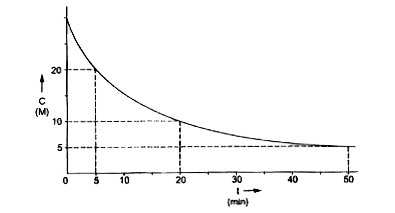Initial concentration of reactant for nth order reaction is 'a'. Which of the following relations is correct about t1/2 of the reaction?
In t1/2 = In (constant) - (n-1) logea
In t1/2 = In n+ In (constant) - In a
t1/2 = In n = In (constant) + In a0
In t1/2=n In a0
The correct Answer is:A
(t1/2∝a1−n0),n= order of the reaction.
Similar Questions
For a reaction , the concentration of the reactant C varies with time t as shown by the following graph .

what do you conclude about the order of the reaction ?
View SolutionIf the initial concentration of reactant in certain reaction is double, the half-life periof of the reaction doubles, the order of a reaction is
View Solution
Knowledge Check
Initial concentration of reaction for nth order reaction is 'a' . Which of the following relations is correct about t1/2 of the reaction ?
Alnt1/2=ln(constant)−(n−1)logeaBlnt1/2=ln(constant)−lnaCt1/2lnn=ln(constant)+lna0Dlnt1/2=nlna0If a is the initial concentration of the reaction and t1/2 is the half change time. Which of the following in true of the nth order reaction
At1/2∝an−1Bt1/2∝anCt1/2∝a1−nDt1/2∝an+1In a reaction A →Product, the initial concentration of reactant is a mol L–1. If the order of the reaction is n and the half life ist1/2 then the correct proportionality is:
At1/2∝an−1Bt1/2∝anCt1/2∝1anDt1/2∝1an−1
If initial concentration of reactants in certain reaction is doubled, the half-life period of the reaction doubles, the order of a reaction i
View SolutionIf doubting the initial concentrations of a reactant doubles t12 of the reaction , the order of the reaction is
View SolutionConsider the following in respect of zero order reaction.
I. t1/2 is directly proportional to the initial concentration
II. Time taken for the completion of the reaction is twice its t1/2
III Concentration of the reactant decreases linearly with time
Which of the statements given above are correct ?
View Solutionwhen initial concentration of the reactant is doubled, the half-life period of a zero order reaction
View Solutionwhen initial concentration of the reactant is doubled, the half-life period of a zero order reaction
View Solution
